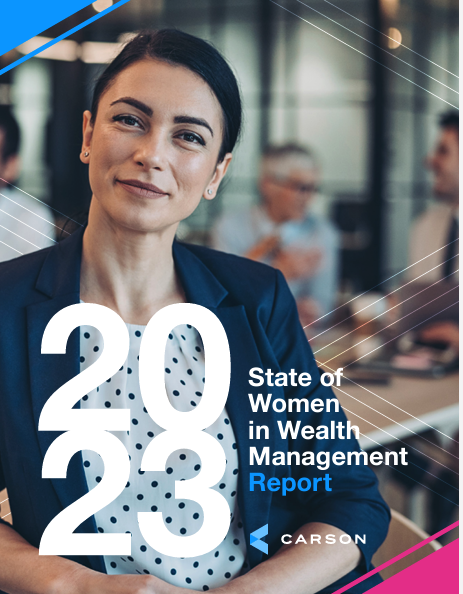Despite heightened awareness, gender diversity in wealth management remains stagnant, according to Carson Group’s 2023 State of Women in Wealth Management Report. The report, which provides insights into the challenges and opportunities women encounter in the financial services industry, builds on its inaugural study to deepen the understanding of gender diversity within the industry.
“The findings of our 2023 Women in Wealth Management study reinforce the crucial role that female financial advisors play in today’s industry. Beyond the qualitative insights, the statistical data underscores the need for continued efforts to enhance gender diversity, promote sponsorship and create inclusive cultures. As we navigate the path forward, it is imperative for both men and women to commit to meaningful change, fostering true gender equity and progress,” said Julie Ragatz, Ph.D. Vice President, NextGen and Advisor Development Programs at Carson Group. “This commitment involves conducting studies like this, building a supportive community, creating inclusive cultures, actively recruiting more women, and ensuring ongoing support for female professionals.”
According to the CFP Board, the percentage of women CFP professionals has only increased by 0.2% to 23% over the last decade. This year’s report, based on a survey of 276 financial advice professionals, highlights critical insights on gender diversity, the impact of female advisors on client relationships and the need for greater representation and support.
Underrepresentation
When it comes to industry representation, the study reveals a gap between male and female respondents regarding the underrepresentation of female advisors in the industry (68% of men and 92% of women agree underrepresentation is a problem).
With women now outliving men by about five years in the U.S., female advisors are increasingly becoming the preferred choice for addressing the unique needs of female clients, and this underrepresentation can hurt firms that aren’t staffed appropriately to meet the changing needs of its clients. Additionally, by 2030, women are expected to control a staggering $30 trillion in financial assets due to these wealth transfers. What’s more, research shows that 70% of women change advisors within a year of losing their partner.
The study emphasizes the ability of female advisors to connect on a deeper level, fostering trust and building strong client relationships. The qualitative analysis also found that many executive women prefer working with female advisors who can truly relate to their experiences, with one respondent noting, “Because there’s such a lack of a female perspective, it really stands out in a good way when you come in with your authentic self and don’t try to fit the mold.”
Motivations for Entering the Industry
The study revealed a shortfall in that the financial services industry needs to do a better job of educating high school and college students about the potential career paths available to them. Only 39% of respondents came into the financial services industry intentionally, with more than half (61%) saying they did not intentionally seek out a career in finance and 59% saying they worked in a different industry prior to their careers in financial services.
While many advisors may have taken an indirect route to wealth management, overall, the majority (93%) of respondents said they found their career in financial services rewarding. This changes by gender, with only 41% of female respondents “strongly agreeing” with the statement, compared to 68% of male respondents. Further, nearly one-third of female respondents have looked for a new role in the last 12 months, showing a potential retention problem for firms keen on keeping female advisors satisfied in their roles.
Making Strides: Sponsorship & Culture
The survey found two-thirds (66%) of respondents deemed mentor relationships critical to their success, citing guidance and direction (27%) and expertise sharing (21%) as key support elements. What the survey uncovered is that women are often over-mentored and under-sponsored. Sponsors, not only guide and provide advice, but also provide opportunities, advocate for credibility and propel women toward leadership roles. Sponsorships play an indispensable role in boosting the careers of female advisors, with one respondent expressing, “Had she not opened doors for me, I don’t know if I’d still be in this industry.”
Most (90%) respondents agree that corporate or firm culture significantly influences their satisfaction at work. That said, many firm leaders aren’t taking a stand. Only 36% of respondents “strongly agree” with the statement, “I feel supported by leadership at my firm” – which was roughly the same between men and women.
Our analysis also found that female advisors want to see women in senior leadership roles provide tangible examples of what women can achieve in this business. Leaders need to be intentional about building an inclusive culture, modeling positive behaviors and supporting employees.
A Path Forward: Commitment to Change
Both men and women agree (59%) that there has been an increase in the representation of female financial advisors during their careers. Still, they also feel that current efforts to increase the number of women in the industry are insufficient.
The 2023 State of Women in Wealth Management report serves as a call to action for the industry to commit to fostering gender equity, eliminating barriers, and creating inclusive cultures that empower and support the success of women.
To view the 2023 State of Women in Wealth Management report, visit https://resources.carsongroup.com/women-in-wealth-report-2023.

